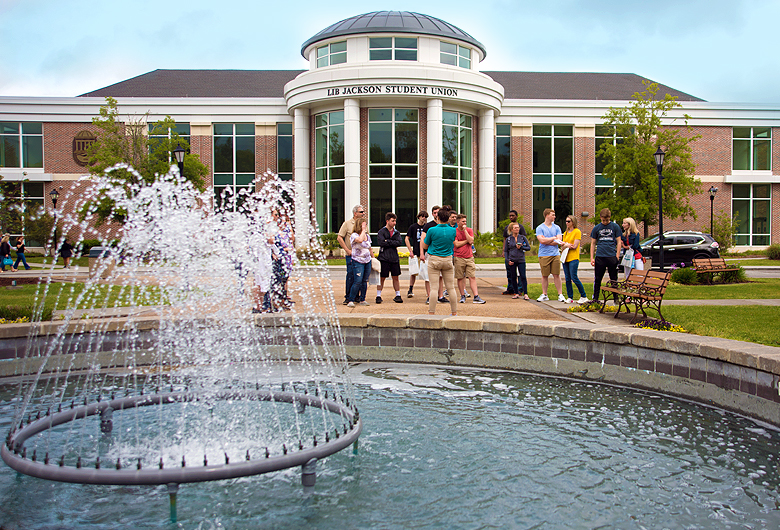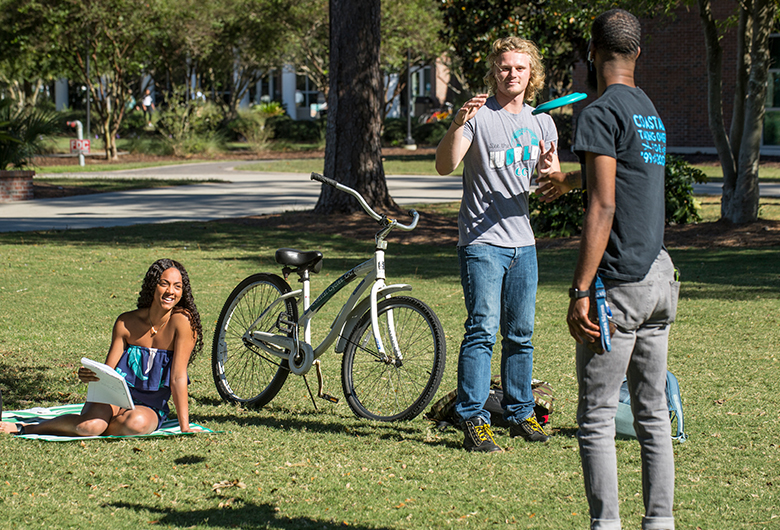COVID-19 Frequently Asked Questions
University Operations
The face covering/mask requirement in The Center for Health and Well-Being is dependent on symptoms at the time of visit. Students will be required to wear a mask in the clinic if they present with an acute flu-like illness, fever, respiratory symptoms, gastrointestinal symptoms, and/or eye infections. Student Health Services may adjust its mask standard according to public health guidance and conditions within the community.
In all other areas on campus, individuals have the option to wear a mask if they choose. University community members are encouraged to use personal discretion in taking appropriate precautions for protection from COVID-19 based on risk for severe illness, vaccination status, and general level of comfort. We ask you to be respectful of others in recognizing their personal decisions to either wear or not wear a face-covering/mask.
The Centers for Disease Control and Prevention (CDC) and the South Carolina Department of Environmental Health and Control (SCDHEC) are now managing COVID-19 as an endemic virus. According to the SCDHEC, the term “endemic” refers to a disease that is circulating in a community at an expected or normal level, minus an occasional outbreak (for example, the flu). With the understanding that there is an acceptable level of COVID-19 in the community, and as public health authorities (CDC and SCDHEC) shift to using severe COVID-19 cases to measure how the virus is impacting local communities, the University is no longer reporting the number of COVID-19 cases on a campus dashboard. The Center for Health and Well-Being continues to report all positive COVID-19 test results to SCDHEC as is required.
SC DHEC has adopted the CDC’s COVID-19 Community Levels and the University is prepared to implement mitigation measures as directed by the SCDHEC to address any public health concerns. Rather than focusing on eliminating all virus transmission, the CDC recommends prevention measures when the level of severe disease in communities has the potential to overwhelm the health care system. The CDC’s Community Levels help communities determine which prevention strategies are needed to prevent local disruptions from COVID-19, increase protection against severe disease and strained hospitals, and save lives.
The COVID-19 vaccine is not required to attend, work for, or visit CCU. However, the University strongly encourages everyone who is medically able to get vaccinated against COVID-19.
If you are a non-US citizen who is a non-immigrant (not a U.S. citizen, U.S. national, lawful permanent resident, or traveling to the United States on an immigrant visa), you will need to show proof of being fully vaccinated against COVID-19 before you travel by air to the United States from another country. For more information, visit the CDC's international travel webpage.
CCU will not ask about the vaccination status of students, faculty, or staff in order for them to gain access to campus, academic facilities, recreational activities, services, or events.
Voluntary international travel may require disclosure of vaccination status and/or compliance with vaccination requirements to meet international location requirements and/or to comply with exceptions to travel processes in order to travel under University sponsorship and/or funding.
Medical personnel in The Center for Health and Well-Being may ask and verify vaccination status for the following reasons:
- Making a medical diagnosis.
- Providing guidance for isolation and quarantine.
Vaccination records include but are not limited to, documents self-reported into the My Student Health Services Portal. Vaccination records are not shared with anyone else, including the public, supervisors, managers, faculty, or any other employee group.
Quarantine and Isolation
Individuals must be free of symptoms related to COVID-19, without a known underlying cause, before reporting to campus or class. Students, faculty, and staff experiencing COVID-19 symptoms should stay home and away from others. Use the CDC's Symptoms of COVID-19 webpage to help make decisions on when to seek testing and medical care.
If you test positive for COVID-19 follow the CDC guidance for isolation and notify your contacts. If you are exposed to COVID-19 please follow the CDC guidance for exposure. The CDC no longer recommends quarantine.
- In order to be excused from class, students should notify their professors of their condition and the dates of their expected absences as indicated by the CDC’s guidance (described above), or they may provide a return-to-work/school notice from their healthcare provider. The University is no longer providing a COVID-19 Call Center or contact tracing. You are responsible for communicating with your professors regarding your absence, just as you would for any other absence. You are responsible for making arrangements to makeup coursework you will miss with your professor.
- Employees who are required to isolate, based on instructions from a healthcare provider or CDC guidance, should notify their supervisors of their absence and the return to work date. If employees are exposed to COVID-19 they should follow CDC guidance for exposure. COVID-19-positive employees should follow return-to-work guidance received by a healthcare provider. If the return date given by the healthcare provider extends beyond the CDC guidance, the employee should obtain and keep their return-to-work notice from the healthcare provider. The employee may be required to furnish a copy of a return-to-work notice to HREO, as directed. Employees should never provide their supervisors with return-to-work notices containing any medical information such as test results or diagnosis.
- Those planning to go abroad, or already abroad, on CCU-sponsored travel are required to immediately reach out to their designated contact person in the Center for Global Engagement to provide both support while abroad and to bring in the University’s international insurance provider for support and claims filing.
The CDC has created a webpage to help determine how long you need to isolate or if you need to take other steps to prevent spreading COVID-19. Visit the CDCs Isolation and Precautions for People with COVID-19 site for more information on isolation timelines.
If you test positive for COVID-19, stay home for at least 5 days and isolate from others in your home. You are likely most infectious during these first 5 days.
- Wear a high-quality mask if you must be around others at home and in public.
- Do not go places where you are unable to wear a mask.
- Do not travel.
- Stay home and separate from others as much as possible.
- Do not share personal household items, like cups, towels, and utensils.
- Monitor your symptoms. If you have an emergency warning sign (i.e. trouble breathing), seek emergency medical care immediately.
Residential students who test positive for COVID-19 will enact their Personal Emergency Action Plan. For more information, contact University Housing.
According to the SC Department of Environmental Health and Control (DHEC), state agencies and institutions do not need to conduct universal contact tracing. As a result, the University is no longer providing the COVID-19 Call Center or contact tracing.
The CDC has developed criteria that utilizes the circumstances of the potential exposure to help determine what actions you should take based on your COVID-19 status. You can review this important information on the CDC’s What to Do If You Were Exposed to COVID-19 webpage. Please note, the CDC no longer recommends quarantine for individuals who have been exposed to COVID-19.
COVID-19 Test & Vaccine
The Center for Health and Well-Being provides COVID-19 testing for students who are symptomatic or have been exposed to COVID-19. The clinic offers rapid COVID-19 Antigen testing with test results provided during the appointment. Student Health Services also has a partnership with LabCorp for off-site testing for COVID-19, Nucleic Acid Amplification (test results in 2-4 days). Specimen collection for both types of tests is a nasal swab. To make an appointment, call Student Health Services at 843-349-6543 or schedule an appointment online.
To find an off-campus testing site near you, visit the Department of Environmental Health and Control (SCDHEC) COVID-19 Testing Locations website.
Free at-home tests can be ordered here.
COVID-19 vaccines are free and widely available to the public. Students, faculty, and staff can find an off-campus local COVID-19 vaccine provider on SCDHEC’s Vaccine Locator website.
COVID-19 vaccines available in the United States are effective at protecting people from getting seriously ill, being hospitalized, and even dying. As with other diseases, you are protected best from COVID-19 when you stay up-to-date with recommended vaccines. Review the CDC's criteria for being up-to-date for each COVID-19 vaccine manufacturer by age group to determine your vaccination status.





